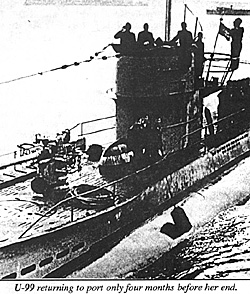 U-99 returning to port only 4 months before her end.
U-99 returning to port only 4 months before her end.
Here is more of the letter from RADM OTTO KRETSCHMER (122-LIFE-1985), and he refers to the end of U-99 on 17 March, 1941.
"I succeeded in getting the majority of the crew safely on board HMS WALKER at the time when more than half the crew, all of those who had been on the after deck when the stern sank under water until the sea water could enter the boat through the conning tower hatch, was washed overboard - by making the following signal with a small MORSE lamp to HMS WALKER:
'From Captain to Captain. Please rescue my men drifting in your direction. I am sinking.'
The signal was acknowledged, the destroyer lighted the water with a signal searchlight, put the scrambling net out and I could see that my men were climbing over the side. Thank God, they were in safety. After the sinking of the boat which I experienced standing at my proper post on the bridge, I was also afloat while WALKER drifted with the wind in our direction. I waited at the ship's side until the last of my men was saved and then approached the scrambling net."
HARRY'S NOTE - Those who have met OTTO KRETSCHMER can easily understand that he would remain at his post on the bridge until U-99 sank out from under him. As he once explained to me he did not abandon his boat, his boat abandoned him. And it is easy to understand that he would remain in the water at the nets until all his men were safely out of danger. This is a Prussian officer and gentleman of the absolutely highest character. Let me also add, that every few years the survivors of U-99 and HMS WALKER gather together for a formal dinner dance. One time it would be in England, the next in Germany. They all sign the historical card that tells of this gathering, and they all have a great time with no old hatred or propaganda. Captain Donald MacIntyre, the Skipper of HMS WALKER, took OTTO's binoculars from him that day in March of 1941, but some years ago, he gave them back to OTTO........'Yesterday's Enemies; Today's Friends.'
Russia Trip 1994
Additional mail from RADM OTTO KRETSCHMER (122-LIFE-1985) - he and his wife just returned from a shipboard tour of Russia, and he makes these observations:
"My wife's and my trip to Russia was touristic wise a full success. The tour was a great adventure for me who had never before had got the permission to cross the IRON CURTAIN. My wife, who had taken part in an organized tour for doctors about 25 years ago to the two cities (St. Petersburg and Moscow) as well as to Kiev, Tiflis and Erivan found that in communist times, these two cities had appeared much cleaner than nowadays. Going by ship from St. Petersburg to Moscow through the lakes Ladoga and Onega and via the rivers and canals through the vastness of the country was quite an experience. Most interesting to visit were the medieval, mostly fortified monasteries and castles with their pasts of notorious political importance.
"Happy Time"
The term 'HAPPY TIME' for the first year of submarine operations of World War II is unfortunate to say the least. It was unhappy for those who took part.
The term can only have been coined by journalists or other people who did not go to sea in submarines. The term is untrue for various reasons:
THE PROBING OF
- the British and French defenses (shipbourne and coastal, ASDIC, mine fields, area and inshore supervision, the role of surface ships and Coastal Command aircraft, their reconnaissance methods, their hunting weapons, tactics and techniques etc.);
- the behaviour of the targets (warships, armed/unarmed and fast/slow merchant ships, armed merchant cruisers, escorted convoys etc.);
- our submarines (their equipment, their capability to endure punishment by the enemy, the stress of confinement for the crews during their long-time war patrols etc.);
- our weapons:the torpedo in both forms turned out to be completely unreliable. This state of affairs lasted for me until the end of my wartime career in March 1941. With intact torpedoes or with those of later design, my successes would have amounted to about double the score of shipping and also more than four warships.
- our various installations, of which I had troubles with the gyro-compass and the packing of the outboard lock of the diesel engine exhaust - to mention a few - the older U-23 and in U-99, an unreliable torpedo firing director and ultimately trouble with the attack periscope.
- different sea areas; when (with U-99) I was sent for the first time into the Western Atlantic I went to U-Boat Command for information about the experiences in Atlantic operations. The news was - of six U-Boats sent there recently there were still three alive - 50% losses. Their captains were no newcomers, all of them were peace-time trained submarine Skippers. This happened in July 1940 and is now being called a 'HAPPY TIME' by easy-going writers.
- our tactics, which soon needed a development. The attack method shifted almost fully to the night-surface attack.
Otto Kretchmer Letter (KTB 105)
Otto Kretchmer Letter (KTB 106)
Otto Kretchmer Letter (KTB 107)
Otto Kretchmer Letter (KTB 108)
Otto Kretchmer Letter (KTB 109)
Otto Kretchmer Letter (KTB 110)
Otto Kretchmer Letter (KTB 111)
Back to KTB #108 Table of Contents
Back to KTB List of Issues
Back to MagWeb Master Magazine List
© Copyright 1994 by Harry Cooper, Sharkhunters International, Inc.
This article appears in MagWeb (Magazine Web) on the Internet World Wide Web. Other military history articles articles are available at http://www.magweb.com
Join Sharkhunters International, Inc.: PO Box 1539, Hernando, FL 34442, ph: 352-637-2917, fax: 352-637-6289, www.sharkhunters.com
